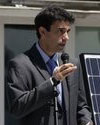Using Community-Based Actions to Address the Health Risks of Chemicals Spread by Extreme Weather Events
Project Overview
In 2015, local residents, business owners, and researchers in Brooklyn’s Sunset Park launched a community-based initiative to address health risks from improperly stored chemicals that may spread during extreme weather events, also called fugitive chemicals. Lead by stakeholders, the initiative involves researchers, community members, and small business owners working together to collect data that will inform efforts to prevent chemical releases during storm surges and flooding.
Citizen involvement includes:
- Shaping research questions and interventions
- Gathering an inventory of chemicals used at small businesses, primarily auto shops, as part of a business resiliency team
- Developing a business resiliency toolbox, a set of guidelines and best practices, to help auto shops prevent the release of fugitive chemicals
- Training auto shop owners on use of the business resiliency toolbox
Background
The Sunset Park community contains New York City’s largest industrial waterfront, making it vulnerable to extreme weather events such as storm surges and flooding. Coastal storms in this area increase the risk of exposure to fugitive chemicals, which can originate from both residences and businesses.
Auto shops are the most common small businesses found along the industrial waterfront in Sunset Park. These businesses play a significant role in the economic fabric of the community, and are especially vulnerable to the impacts of extreme weather. Given the types of materials that auto shops use for vehicle maintenance and repair, they are a potential source of fugitive chemicals.
UPROSE, a local grassroots organization, promotes on-the-ground efforts to address the health risks of fugitive chemicals through community-based actions in Sunset Park. The fugitive chemical health risks initiative, hereafter the initiative, evolved from broader efforts within the Sunset Park Climate Justice Center. Launched in 2012, the Climate Justice Center coordinates resources and engages residents and local businesses in adaptation and resiliency plans. These efforts are aimed not only at responding effectively to future severe weather events, but also advancing transition of a fossil-fuel based economy towards locally-driven climate solutions.
Citizen Involvement
UPROSE promotes this collaborative initiative to residents and business owners in Sunset Park. Using a community-based participatory research and intervention approach, UPROSE aims to help community residents and owners of small auto shops identify and implement best practices to reduce the potential release of, and exposure to, fugitive chemicals.
A local community group oversees the project on the ground from beginning to end. This group includes a variety of stakeholders – local youth, industry representatives, city and state agencies, and elected officials – that reflect the diversity and economic dynamics of the community. The stakeholders bring a unique perspective to the project, helping shape the research questions as well as the intervention approaches.
UPROSE offers extensive training for community residents that lead the initiative’s business resiliency team. This includes training in aspects of outreach, recruitment, and data collection via technical surveying methods. The business resiliency team is responsible for reaching out to owners of auto shops to gather an inventory on the types of chemicals and substances that are used. The team is also working with UPROSE, community stakeholders, and researchers to develop a business resiliency toolbox.
Outcomes
Community-level outcomes. The initiative will increase local knowledge about the potential health impacts of fugitive chemicals, and build local capacity to implement community-based actions that will reduce the risk of exposure to these chemicals.
A block-by-block survey led by the business resiliency team has already produced a rich catalog of data on auto-related businesses, physical building characteristics, and areas of vulnerable adjacent land use. This data will inform the development of business activity profiles, which will be used to model and characterize chemical exposures originating from the local auto shops.
The business resiliency toolbox is made to fit into the operational capacities of small auto shops, and will help auto shop owners better address the risks of fugitive chemicals. The business resiliency team will lead trainings for auto shop owners to familiarize them with the toolbox and to help them implement necessary protocols to reduce the risks of exposure to fugitive chemicals. The toolbox will then undergo pilot testing by auto shop owners to determine how effective it is as a resource for reducing the release of fugitive chemicals within the community.
Challenges
Facing and overcoming economic challenges. The economic conditions affecting small, local businesses represent the largest obstacle for the initiative. For example, UPROSE and collaborators have noticed a trend in real estate speculation and rezoning proposals along the waterfront, where small businesses are displaced to accommodate larger upscale commercial industries. This changing business climate poses a threat to the economic viability of auto shops and other small businesses in the area.
These economic challenges add another level of urgency and importance for the initiative. While UPROSE is focusing on building local capacity for climate resiliency in Sunset Park, they are also hoping to positively impact the economic resiliency of small businesses in the area. In response to the increasing real estate pressures along the industrial waterfront, UPROSE launched a campaign and coalition called "Protect Our Working Waterfront Alliance." This coalition provides a mechanism to preserve local industries within Sunset Park, prevent displacement of working-class residents and blue-collar businesses, and to develop methods for climate adaptation and resilience.
Contact(s)
-

-
Ryan Chavez
UPROSE Infrastructure Coordinator - [email protected]
-

-
Elizabeth Yeampierre
UPROSE Executive Director - [email protected]
Related Information
- Visit the UPROSE website for information on other ongoing climate resiliency initiatives in Sunset Park.
- Visit the NIEHS Research to Action Webpage for a broad description of the fugitive chemical health risks initiative.
- Watch a vimeo clip to learn more about the "Protect Our Working Waterfront Alliance" campaign and coalition.


